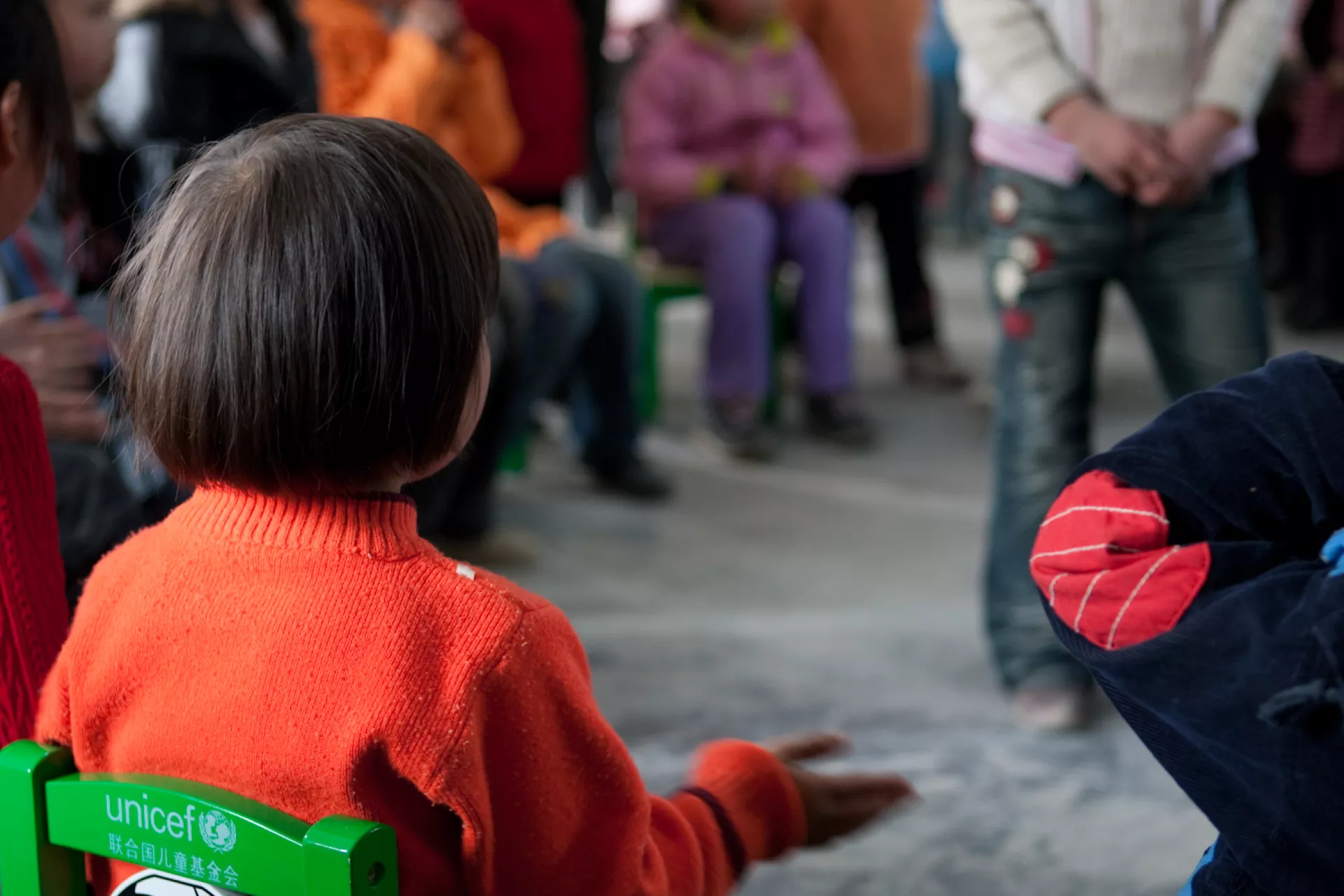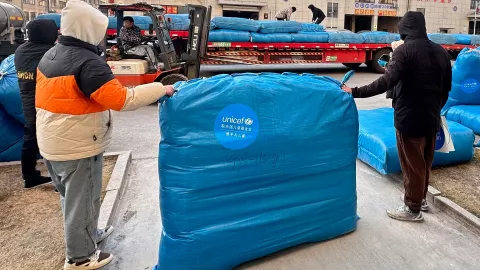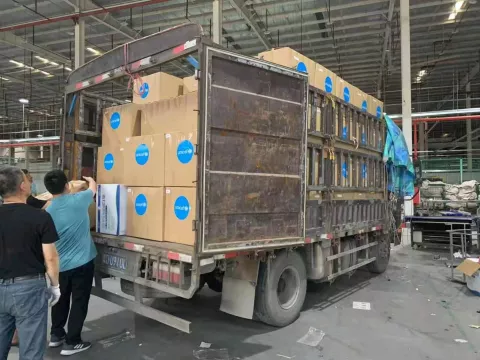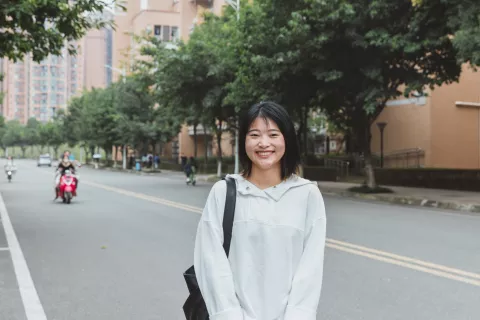Reviving Hopes and Dreams for Children in China's Quake Zone
Reviving Hopes and Dreams for Children in China's Quake Zone

- Available in:
- 中文
- English
It is early March and spring has come to the Sichuan earthquake zone. Vast swathes of bright yellow rapeseed flowers stretch across farm fields dotted with newly built houses. Doudou, a 6-year-old girl, rides her new bicycle on a sunny day with a friend chasing after her in front of a UNICEF-supported Child Friendly Space in Beichuan County, one of the communities worst-hit by the Wenchuan earthquake last May.
Unlike other children who were accompanied by their parents, Doudou came to the centre with her 62-year-old grandfather. The earthquake had taken the lives of her parents in an instant, leaving her and her brother Xinxin, orphans.
Return of smiles
"In the first few months, the children would wake up in the middle of the night crying for their mother and father to come back," said Doudou's grandfather, surnamed Wang. "Doudou refused to talk to anyone and was sad for a very long time. I didn't know how to comfort them."
Doudou's parents were among the more than 10,000 residents of Beichuan County killed by the earthquake and subsequent landslides. The remains of the deceased could not be retrieved from under tons of earth and debris.
Government reports say the quake left 69,227 people dead, 374,643 injured and 17,923 missing – the worst quake to hit China in more than 30 years.
With the National Working Committee on Children and Women, UNICEF has set up 34 Child Friendly Spaces in the Wenchuan earthquake zone and another 6 in the Panzhihua earthquake zone to provide long-term psychosocial support for children and their families.
The Child Friendly Space is a place where children can attend group activities such as singing, dancing, painting, and playing games. According to Kirsten Di Martino, UNICEF China Chief of Child Protection, these simple activities help children to bond with each other, to feel that they are safe and not alone.
Nearly one year on from the earthquake, Doudou and Xinxin are bouncing back with help from their regular visits to the Child Friendly Space in their resettlement camp.
"After going to the Child Friendly Space and playing with the other kids, Doudou gradually started to laugh. Now she is a little girl with a sunny personality. She stays in the Child Friendly Space until the teachers are forced to ask her to go home and come back the next day," Doudou's grandfather said, as he smiled.
Doudou and her brother now receive government subsidies. "Doudou loves dancing and riding her bike. Her brother Xinxin dreams of becoming a scientist to invent a device to prevent earthquakes in the future," said the grandfather.
"I am so grateful to all those kind-hearted people. When they grow up, I hope they can also do good things to return the favours." The grandfather said.
Stepping out from the shadow
According to attendance records, the UNICEF supported Child Friendly Space initiative has so far provided psychosocial services to 42,000 children in 40 earthquake-affected communities.
"Children are very resilient. About 90% to 95% of children recover naturally from trauma, while about 5% to 10% may need individual or more specialized care and support," said Kirsten Di Martino, UNICEF China Chief of Child Protection, "Experts have noticed that children start to laugh and show more optimism after attending psychosocial workshops."
Xiaozhu, aged two, was buried with her mother for four hours in a collapsed supermarket in Beichuan County. When rescuers dug them out, the baby girl was covered with blood from her mother who was severely injured. But Xiaozhu was not hurt at all.
"She was so scared that she didn't say a word for a month," Xiaozhu's grandmother said. "I took her to the Child Friendly Space as soon as it opened. At first, she didn't speak or play with other children. She hit anyone who touched her toys. Now Xiaozhu is getting along well with other children and can speak."
Ms. Tang Xiaoping, the manager of the Child Friendly Space in Anxian County's Feishui Town, also observed the changes in the children. Four months after the earthquake, she and the other staff invited children to freely draw pictures to assess their psychological condition. Though most of the children painted beautiful flowers, dogs, and the sun, Tang found a few children still plagued by their earthquake experiences.
"A 12-year-old girl drew a picture of bricks falling from shaking buildings and people running for their lives in the streets. Another boy painted a sinking boat with people drowning in the river when the quake hit. A little girl drew a picture of herself and told me that she could barely stand on that day," Tang recalled.
"Early this year, we again invited children to paint pictures. Now all you can see are colourful balloons and smiling faces."
Road to recovery for students
"After the quake the students had difficulty concentrating on their studies. Once a student's pencil box fell from the desk and hit the ground with a loud thud, and the whole class was scared and some screamed out 'Earthquake!'" she said.
"In the first few months after the earthquake, there were frequent aftershocks. Although we had resumed class in tents, students still ran out in panic and the teachers had to calm them down saying that it was safe inside."
"After the Child Friendly Space opened last year, I often told my students to go there to play after school or on weekends. They love going and some of them have even become volunteers to help take care of the younger kids. They say that many volunteers came to support them and their families immediately after the quake. So they want to help others too," she said.
Zixuan, aged 12, was buried under the rubble along with her classmates, when her school building collapsed in the earthquake.
"There are two Child Friendly Spaces near my home and I go to both sites on the weekends. I read books about drawing and I play ping pong with friends. The place makes me feel comfortable and at home because there are many friends I can play with," she said.
A long-term commitment
Ms. He Liping, chairwoman of the Women's Federation of Beichuan County's Leigu Town, lost her own daughter in the earthquake. Her daughter was one of more than 1,000 students who were killed when Beichuan Middle School collapsed. "I was devastated and lost all hope," said Ms. He.
Though the government waived the one-child policy for parents who lost their children in the earthquake, Ms. He, who is in her late 40s, was unable to have another child. "When UNICEF approached us for the purpose of setting up two Child Friendly Spaces in our town, I gathered up myself and gave my full support to help our children step out of the shadow of the earthquake," she said. "Up to now, the Child Friendly Spaces in Leigu Town have received more than 6,000 visits from children and parents, according to daily attendance records."
"Through working with UNICEF in the Child Friendly Spaces, I myself became more optimistic, and I overcame the sorrow of losing my own daughter. When I look at them, I see my own daughter. I wish the Child Friendly Space project could run forever and bring more smiles to children," she said while playing with children.
Ms. He and some 120 Child Friendly Space staff are now still working in the worst-affected communities for the recovery of children.
"UNICEF is committed to assisting the government in providing psychosocial support to children in the earthquake zone until 2011, in line with the Government of China's reconstruction plan," said Di Martino. "But we hope that through working with local counterparts, we will be able to sustain the support as long as possible."
*Pseudonyms are used in this story to protect the identities of children and their families.




